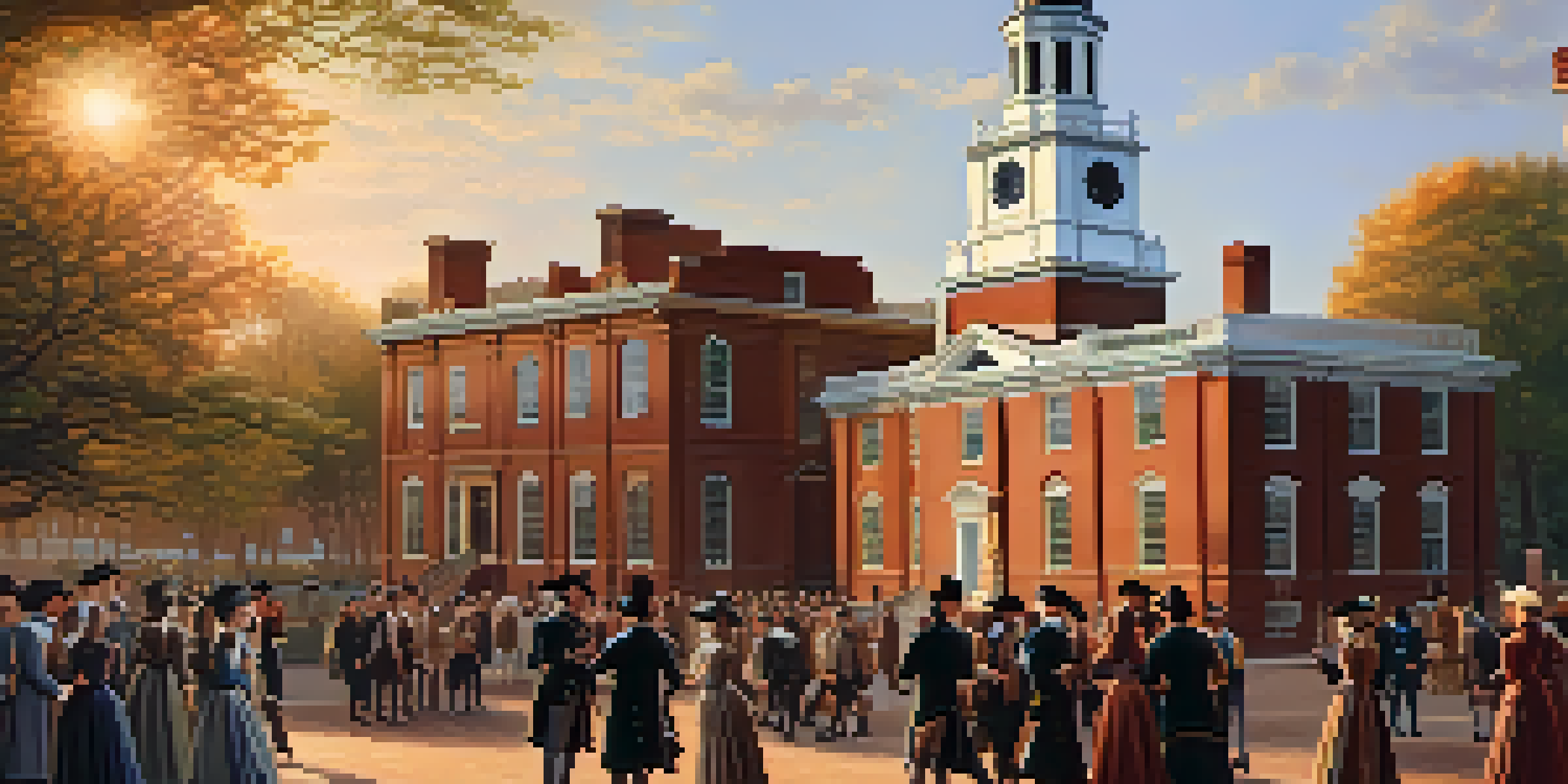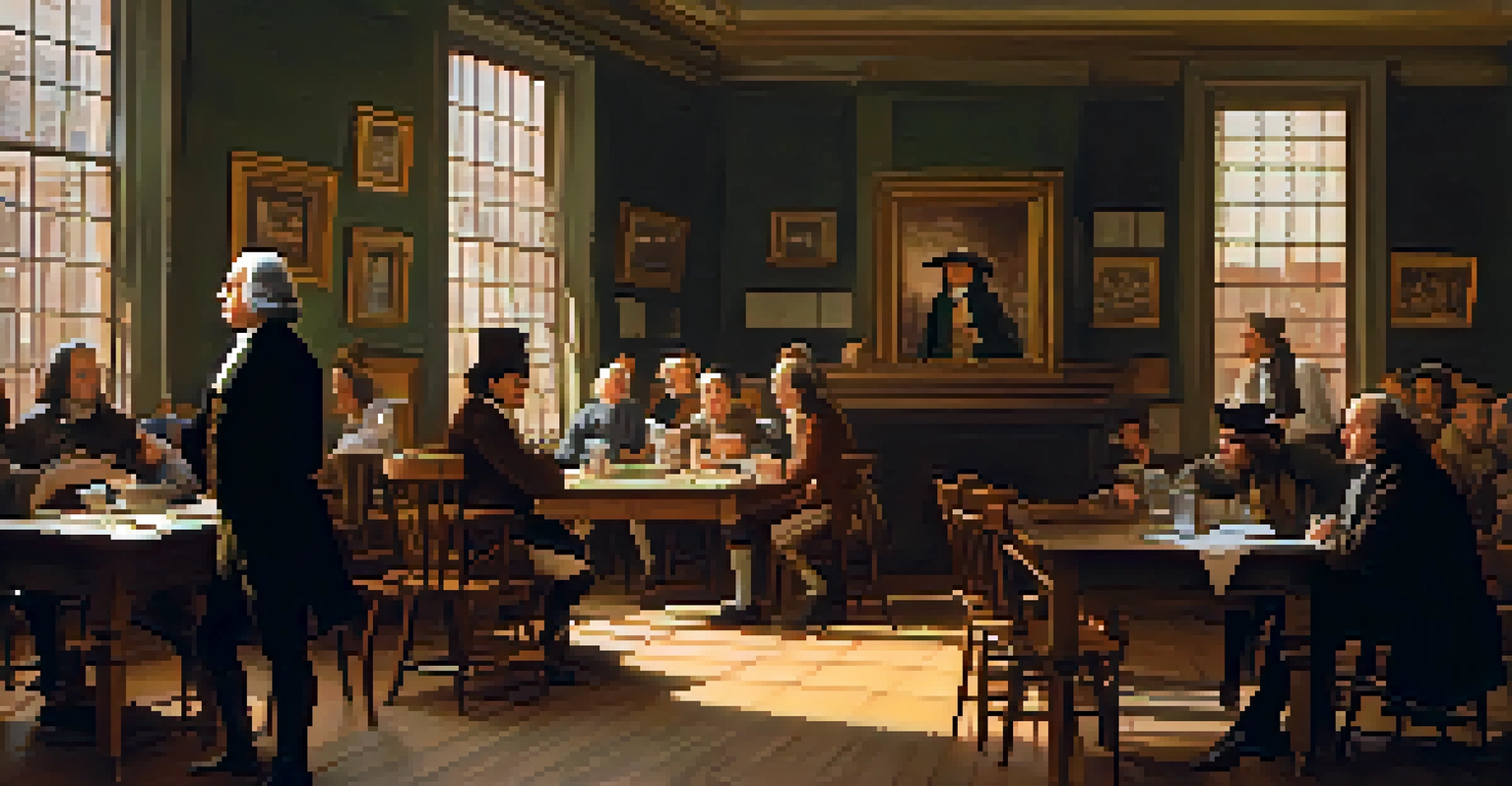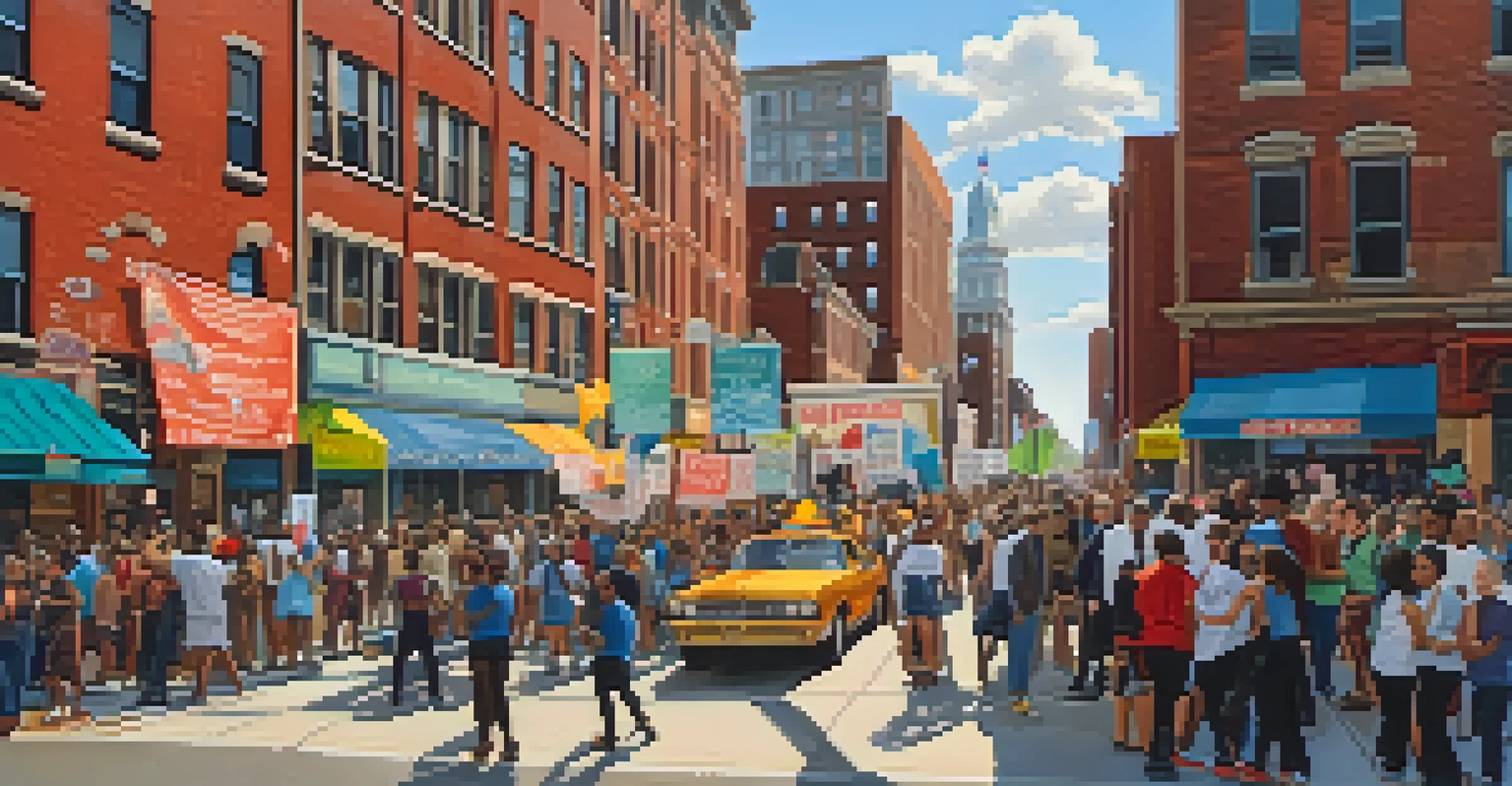Philadelphia: A Hub of Revolutionary Activities and Ideas

The Birthplace of American Independence: A Historical Overview
Philadelphia holds a special place in American history as the birthplace of independence. In 1776, the Declaration of Independence was adopted in the Pennsylvania State House, now known as Independence Hall. This monumental event marked the beginning of a nation’s quest for freedom, making Philadelphia a key player in revolutionary activities.
The only thing we have to fear is fear itself.
The city quickly became a melting pot of revolutionary ideas and thinkers. Influential figures such as Benjamin Franklin and Thomas Jefferson gathered here, exchanging ideas that fueled the desire for self-governance. Philadelphia was not just a location; it was a vibrant hub where visions for a new nation took shape.
As the site of the Constitutional Convention in 1787, Philadelphia solidified its role in shaping the United States. Delegates convened to create a framework for governance, emphasizing principles such as liberty and justice. This legacy continues to resonate, as Philadelphia’s contributions remain pivotal in understanding American democracy.
Key Figures of the Revolution: Influencers in Philadelphia
Philadelphia wasn’t just a backdrop; it was home to some of the most influential figures of the American Revolution. Benjamin Franklin, a polymath and a founding father, used his printing press to spread revolutionary ideas. His writings inspired many to question British rule and seek independence.

Thomas Jefferson, the primary author of the Declaration of Independence, also spent considerable time in Philadelphia. His experiences in the city shaped his views on liberty and governance, making him a crucial figure in the revolutionary landscape. The discussions held in the salons and coffeehouses of Philadelphia were instrumental in the development of these revolutionary ideas.
Philadelphia: Birthplace of Democracy
Philadelphia was pivotal in shaping American independence, hosting key events like the adoption of the Declaration of Independence and the Constitutional Convention.
Another notable figure, John Adams, also found his voice in Philadelphia. He passionately advocated for independence during the Continental Congress, helping to rally support for the cause. These leaders worked collaboratively, demonstrating the power of dialogue and shared vision in the fight for freedom.
The Role of the Continental Congress in Philadelphia
The Continental Congress, which met in Philadelphia, played a critical role in coordinating the colonies' response to British aggression. This assembly was where leaders from various colonies came together, laying the groundwork for a unified front against British rule. By convening in Philadelphia, they signaled the importance of collaboration in the face of adversity.
Liberty, when it begins to take root, is a plant of rapid growth.
During its sessions, the Continental Congress debated critical issues, from military strategy to foreign diplomacy. The decisions made within the walls of Independence Hall influenced the course of the revolution. The city became synonymous with revolutionary fervor, as it was here that the call for independence was formally made.
The meetings of the Continental Congress also served to strengthen the bonds among the colonies. Leaders who may have been rivals in peace found common ground in their quest for liberty. This unity, fostered in Philadelphia, became essential for the eventual success of the American Revolution.
The Declaration of Independence: A Defining Document
The Declaration of Independence, adopted on July 4, 1776, is perhaps the most famous product of Philadelphia's revolutionary spirit. This document not only declared the colonies’ intention to break free from British rule but also articulated the fundamental principles of human rights and governance. It was a bold statement that resonated far beyond the borders of the young nation.
Written primarily by Thomas Jefferson, the Declaration emphasized ideals such as equality and the right to life, liberty, and the pursuit of happiness. These words inspired not only Americans but also people around the world seeking freedom. Philadelphia, therefore, became a symbol of hope and a rallying point for revolutionary movements globally.
Influential Figures Shaped Ideas
Prominent leaders such as Benjamin Franklin, Thomas Jefferson, and John Adams collaborated in Philadelphia to inspire revolutionary thoughts and actions.
The signing of the Declaration in Philadelphia was a moment of great significance. It marked a collective commitment to stand against tyranny and fight for self-determination. This historic act continues to inspire generations, reminding us of the power of words in the pursuit of justice.
Philadelphia's Role in Revolutionary War Efforts
As the Revolutionary War unfolded, Philadelphia served as a crucial operational hub for the Continental Army. The city was not only a center for political activity but also for military strategy. Leaders like George Washington relied on the support and resources that Philadelphia could provide during the war.
The city hosted the Continental Army’s supply depots, where essential goods and weapons were gathered. Philadelphia's artisans and merchants played a vital role in equipping the troops, demonstrating the community’s commitment to the revolutionary cause. This grassroots support was crucial in sustaining the fight against British forces.
Moreover, Philadelphia served as a refuge for many revolutionary leaders during the war. It was a place where they could plan their next moves and strategize for future engagements. The city’s significance as a military stronghold further established its identity as a center of revolutionary activities.
Cultural Influence: Philadelphia’s Revolutionary Legacy
Philadelphia's revolutionary legacy extends beyond politics and military strategy; it permeates the city’s culture. The ideals of liberty and democracy that were fervently discussed in Philadelphia have shaped its cultural landscape. From art to literature, the spirit of the revolution is deeply embedded in the city's identity.
The city has also produced numerous cultural works that celebrate its revolutionary past. Museums, historical sites, and festivals keep the spirit of independence alive, ensuring that both residents and visitors can appreciate its rich history. Philadelphia’s commitment to honoring its heritage is evident in how it promotes civic engagement and community involvement.
Cultural Legacy of the Revolution
The revolutionary spirit of Philadelphia continues to influence its culture and civic engagement, highlighting the ongoing pursuit of justice and equality.
Moreover, the influence of Philadelphia’s revolutionary ideas can be seen in contemporary movements for social justice and equality. The city continues to serve as a platform for voices advocating for change, echoing the revolutionary spirit that once ignited a nation. This ongoing dialogue reminds us that the fight for freedom and justice is a continuous journey.
Modern Philadelphia: A City Inspired by Its Revolutionary Roots
Today, Philadelphia stands as a vibrant city that pays homage to its revolutionary roots while embracing modernity. The historical sites attract millions of visitors each year, eager to experience the birthplace of American democracy. Philadelphia’s commitment to preserving its history while fostering innovation is a testament to its character.
The city also serves as a hub for political discourse and civic engagement. Residents are encouraged to participate in discussions that shape their community, reflecting the democratic ideals that were born here. This active citizenry fosters a sense of pride and responsibility, connecting the past to the present.

In addition, Philadelphia's diverse population contributes to a rich tapestry of ideas and cultures, making it a dynamic example of what a democratic society can achieve. As it continues to evolve, Philadelphia remains a beacon of revolutionary thought, reminding us that the pursuit of freedom and justice is a timeless endeavor.